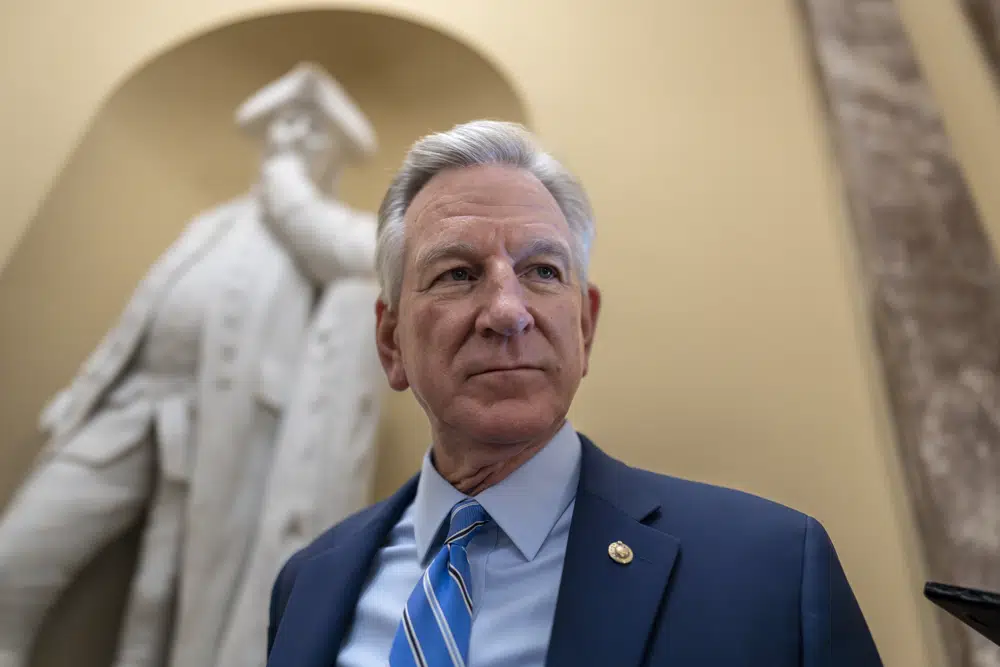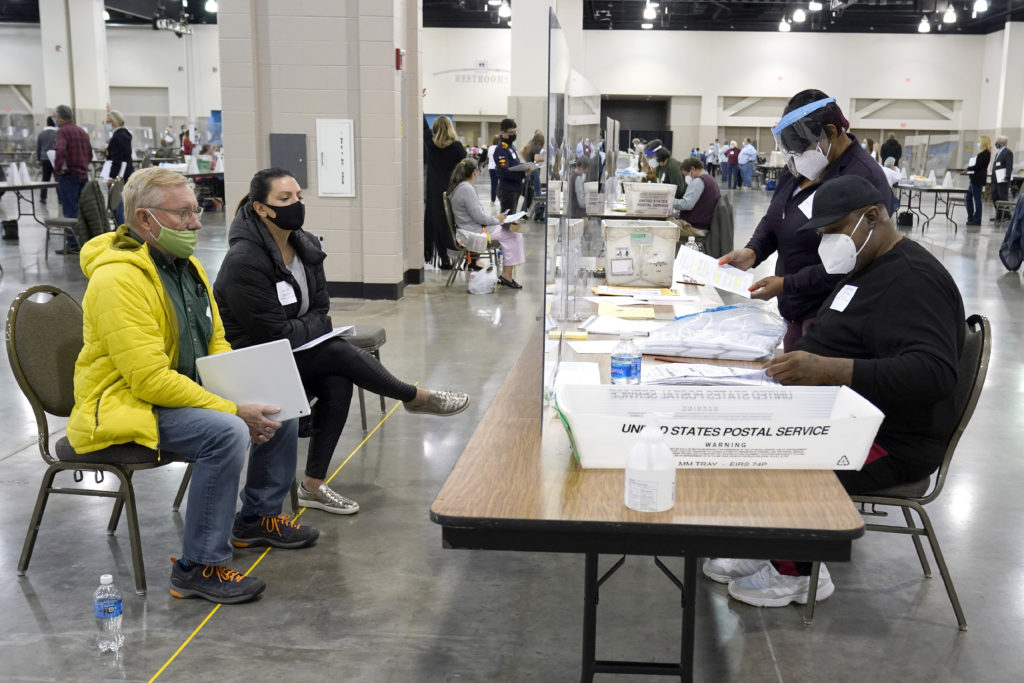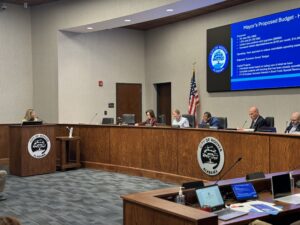Alabama Republican Party qualifying for Alabama House Special Elections opens July 17

The Alabama Republican Party announced on Tuesday that qualifying for the Alabama Republican Party Special Election Primaries in Alabama House of Representatives Districts 16 and 55 will not open until Monday, July 17, 2023, at 8:30 a.m. CDT. The qualifying period will end a week later, on Tuesday, July 25, 2023, at 5:00 p.m. CDT. The Alabama Republican Party advises anyone wishing to qualify for the Republican ballot can do so online at www.algop.org or in person at ALGOP headquarters (3505 Lorna Road in Hoover during the qualifying period. You can also receive more information about the qualifying process by calling ALGOP headquarters at 205.212.5900. To qualify for either seat with the Alabama Democratic Party, call their headquarters in Montgomery at 334 262-2221. The Special Election Primary for both seats will be held on Tuesday, September 26, 2023. The deadline for all independent candidates and/or minor parties to turn in their qualifying paperwork, including ballot access petitions to the Secretary of State’s office is Tuesday, September 26, 2023, at 5:00 p.m. If a Republican or Democratic run-off election is needed, it will be held on Tuesday, October 24, 2023. The General Election will take place on January 9, 2024. The seat in House District 16 covers portions of Jefferson, Tuscaloosa, and Fayette Counties. It became vacant when Rep. Kyle South – a Republican ‘ became the President and CEO of the Chamber of Commerce of West Alabama. House District 55 is located in Jefferson County. The seat became open when Rep. Fred Plump – a Democrat – resigned after pleading guilty to federal wire fraud conspiracy and obstruction of justice charges. Before the two vacancies, the composition of the Alabama House of Representatives was 77 to 28, with Republicans holding a filibuster-proof super majority. There are currently no independents or minor party candidates holding office in either House of the Alabama Legislature. To connect with the author of this story or to comment, email brandonmreporter@gmail.com.
Mitch McConnell and other Republican Senators denounce White nationalism after Tommy Tuberville’s refusal to denounce White nationalists as racists

U.S. Senator Tommy Tuberville (R-Alabama) is being widely criticized for his comments on White nationalists in a recent CNN interview. On Tuesday, U.S. Sen. Mitch McConnell (R-Kentucky) responded, saying there is no place for White nationalists in the military or the country. “White supremacy is simply unacceptable in the military and in our whole country,” McConnell told reporters. The number two Republican in the Senate, Minority Whip John Thune (South Dakota), said there’s no room for white nationalists in the GOP or the military. “I just think there isn’t any place for it,’ Thune said. “We are a country obviously that has built around a set of principles that’s welcoming.” “Ethnic nationalism is un-American, and I think it would be problematic in the military,” said Sen. Marco Rubio (R-Florida). “My definition of a White nationalist is someone that believes that America belongs to white people. That’s not American, that’s un-American, and that would be a problem in the military,” “White supremacy and racism have absolutely no place in our country. Period. The end,” Sen. Katie Britt (R-Alabama) told reporters. This controversy began during an NPR interview in Alabama when Tuberville was asked if White nationalists should be able to serve in the military. “Well, they call them that. I call them Americans,” Tuberville answered. Tuberville followed those comments with an interview Monday on CNN. CNN host Kaitlan Collins said a White nationalist is “someone who believes that the white race is superior to other races.” “Well, that’s some people’s opinion,” Tuberville responded. “My opinion of a White nationalist, if someone wants to call them a White nationalist, to me, is an American. It’s an American. Now, if that White nationalist is a racist, I’m totally against anything that they want to do because I am 110 percent against racism.” Tuberville said White nationalism is “just a cover word for the Democrats now where they can use it to try to make people mad across the country.” Senate Majority Leader Chuck Schumer (D-New York) chastised Tuberville for his opinion, “The senator from Alabama is wrong, wrong, wrong. The definition of White nationalism is not a matter of opinion. “For the Senator from Alabama to obscure the racist nature of white nationalism is indeed very, very dangerous,” Schumer said. “He is fanning the flames of bigotry and intolerance.” “I don’t think Senator Tuberville is in any way racist,” said Sen. Mitt Romney (R-Utah) when asked about Tuberville. “I am totally against anything racist,” Tuberville emphasized. “My opinion of a White nationalist, if you want to call them that, is an American.” Tuberville chastised Democrats for dividing this country and making it weaker. This is not the first gaffe that Tuberville has made on the national stage. Tuberville was criticized in October when he seemed to be saying those Americans who want reparations for slavery are responsible for committing crimes. “They’re not soft on crime. They’re pro-crime. They want crime,” Tuberville said of Democrats. “They want crime because they want to take over what you got. They want to control what you have. They want reparations because they think the people that do the crime are owed that. Bulls**t. They are not owed that.” Tuberville was in Nevada campaigning for GOP Senate candidate Adam Laxalt. Laxalt lost to incumbent Sen. Catherine Cortez-Masto 48.9 to 48.0% a month later. Tuberville has also been widely criticized for his hold on military promotions over the Pentagon’s controversial abortion policy. Tuberville has refused to vote yes on unanimous consent to the promotions over his opposition to the Biden administration’s efforts to thwart pro-life state laws for military members and their families. Despite the criticism from Washington, the Hill reports that Tuberville remains overwhelmingly popular in Alabama, with a commanding majority of Alabamians holding favorable views of the senior Senator from Alabama. To connect with the author of this story or to comment, email brandonmreporter@gmail.com.
Steve Flowers: Annual legislative session successful

The recently completed Regular Session of the Alabama legislature was a success. It began on a high note and ended positively. Why? There was plenty of money to spend. Both the General Fund Budget and the Education Budget had historic amounts of money. Most of the focus of the Session was on budgeting, as it should be, because that is the only constitutional mandate that the legislature is tasked with in the 105-day Regular Session. Gov. Kay Ivey laid out her agenda in her State of the State address, then sent her proposed budget requests over to the legislature. The governor’s speech outlining her legislative agenda was about doing good things for education. However, her desires were vague, and her ask list was long and wishful, like a kid’s Christmas wish list. It called for the state to give away the store. It was as though she was running for reelection, which everyone knows she cannot do. Therefore, the veteran Senate treats her politely but has relegated her to a lame-duck status. The legislature has taken total control of the budgeting process, as they should do under the Constitution. The governor proposes, and the legislature disposes. The days of a strong-armed, powerful, omnipotent governor that controls both the Executive and Legislative Branches are over. The King George Wallace era is gone, probably forever. The surplus in the Education Budget was enormous. How to spend this surplus became the focus of the entire session. There is a very accurate political assessment that it is much more difficult to deal with a surplus budget than a lean or deficit budget. George Wallace told me about this same thing during his last term as governor when I was a freshman legislator. Accolades go out to Senator Arthur Orr (R-Decatur), Chairman of the Senate Education Finance and Taxation Committee, and Representative Danny Garrett (R-Trussville), Chairman of the House Education Ways and Means Committee. These two gentlemen essentially singlehandedly wrote the Education Budget and did a masterful job. They were cognizant that what goes up has to come down. Therefore, they created several savings accounts and rainy day funds for the rainy days ahead because they will come. The Education Budget was an historic $11.5 billion. It gave increases for pre-kindergarten programs, school supplies, school nurses, and a significant 2% cost of living salary increase to teachers and support personnel. All colleges and universities in the state received increased funding. Non-education entities were given money. There was $100 million for prison education. The high-profile aspects of the Education Budget windfall were a one-time rebate going back to taxpayers in November. Governor Ivey had wished for a $400 per person and $800 per couple rebate. However, the final result is $150 per person and $300 per married couple. Most legislators preferred eliminating the grocery tax or long-term tax cuts to this one-time check back in November. The surprise in the Christmas stocking from the Education Budget surplus is the reduction on the state sales tax on groceries. Eliminating or reducing the state tax on groceries has been championed by Democrats for years, as the tax is regressive and hurts the state’s lowest income earners the hardest. However, the measure garnered Republican bipartisan support this year after 20 years and passed with an overwhelming vote in both Chambers. It is, however, a gradual reduction. The grocery tax would decrease 2% in two steps, with the tax being reduced 1% this year and another 1% percent new year, if the funds are available. The State General Fund had a good year as well. The $3 billion General Fund was record-shattering—the largest in history. The Chairmen, Senator Greg Albritton (R-Escambia) and Representative Rex Reynolds (R-Huntsville) oversaw a $159 million increase over the current year. The largest increases in the budget were in Medicaid by $69 million and Corrections by $59 million more. State employees will see a 2% increase in pay, which will go into effect as the new fiscal year begins October 1. The legendary head of the Alabama State Employees Association, Mac McArthur, has quietly garnered state employees a cost of living raise five out of the last six years. See you next week. Steve Flowers is Alabama’s leading political commentator. His weekly column appears in over 60 Alabama newspapers. He served 16 years in the state legislature. Steve may be reached at www.steveflowers.us.
Alabama awards $2.6M for local transportation projects

Alabama Gov. Kay Ivey announced Tuesday that $2.6 million had been awarded to municipalities and counties for 11 road and bridge projects. The funds originate from the Annual Grant Program, which is part of the Rebuild Alabama Act signed into law in 2019 that increased the state’s gasoline tax by 10 cents per gallon. The program requires the Alabama Department of Transportation to set aside $10 million from the increased tax for local projects. “Alabama is tackling the issue of critical transportation infrastructure needs with determination and an answer to the problem at hand – that solution is Rebuild Alabama,” Ivey said in a news release. “The projects we are announcing today will continue to provide substantial progress all across our state.” Of the 11 projects, municipalities and counties contributed $1.6 million in matching funds, even though they aren’t required for participation in the grant program. The projects are required to begin construction within one year of the award of funds. This is the second round of funding after $5.1 million was awarded to 21 projects. The local grant program has allocated more than $137 million in state transportation funding in all 67 counties. The project list includes:
Tommy Tuberville urges Supreme Court to rule Consumer Financial Protection Bureau’s funding structure unconstitutional

On Tuesday, U.S. Senator Tommy Tuberville joined Senator and presidential candidate Tim Scott in filing an amicus curiae brief to the U.S. Supreme Court in Consumer Financial Protection Bureau, et al., v. Community Financial Services Association of America, Limited, et al. The brief urges the Court to uphold the Fifth Circuit’s decision that the Consumer Financial Protection Bureau’s (CFPB) funding structure is unconstitutional and to make the Bureau’s funding subject to congressional appropriations. The brief states, “The Court need not determine which particular aspect of the CFPB’s funding scheme is the most problematic. This is the easy case. The CFPB ‘is in an entirely different league’ from other entities when it comes to its insulation from Congress… to the point that the CFPB currently operates as ‘a sort of junior-varsity Congress’ setting its own funding levels in perpetuity… Such insulation means that Congress itself is not determining the CFPB’s funding. The Court should affirm the judgment below, which will return the matter of the CFPB’s funding to the normal political and legislative channels, as Article I and the Appropriations Clause require.” Sen. Tuberville represents Alabama on the Senate Committee on Banking, Housing, and Urban Affairs, where Sen. Scott is the Ranking Member. Tuberville and Scott were joined in the brief by Chairman Patrick McHenry (R-North Carolina) of the House Financial Services Committee; Representative Andy Barr (R-Kentucky), the Chairman of the Subcommittee on Financial Institutions and Monetary Policy, and Representative Bill Huizenga (R-Michigan), the Chairman of the Subcommittee on Oversight and Investigations in a bicameral group of 132 members of Congress. “Thankfully, our government has a system of checks and balances, one of which includes congressional oversight and the power of the purse—appropriations,” Sen. Scott said. “In these important and trusted roles, we analyze and scrutinize the executive branch’s actions on behalf of the American taxpayer, so that the voices of the country’s citizens are heard and their viewpoints reflected. Unfortunately, the Consumer Financial Protection Bureau—or the CFPB—is a notable exception. It is not accountable to Congress or the American taxpayer through the appropriations process, and it routinely and brazenly acts outside of the scope of its authority.” Then U.S. Sen. Richard Shelby raised similar constitutional concerns over the independent funding mechanism of the CFPB when he was in office, and the Obama Administration created the CPFB. “For years, I have argued that supporters of Dodd-Frank sacrificed our Constitution in the name of bureaucratic independence,” Shelby stated. “While the court’s ruling today is a victory for accountability, it is meaningless without a President who is willing to rein in the unmatched authority of the CFPB’s Director.” Sen. Shelby concluded, “That is why it is critical for the Bureau to be subject to the congressional appropriations process and governed by a board of directors. Only then will Congress have the ability to conduct meaningful oversight to ensure that the CFPB is truly accountable.” Tommy Tuberville was elected to the Senate in 2020. To connect with the author of this story or to comment, email brandonmreporter@gmail.com.
GOP confidence in 2024 vote count low after years of false election claims, AP-NORC poll shows

Few Republicans have high confidence that votes will be tallied accurately in next year’s presidential contest, suggesting years of sustained attacks against elections by former President Donald Trump and his allies have taken a toll, according to a new poll. The Associated Press-NORC Center for Public Affairs Research poll finds that only 22% of Republicans have high confidence that votes in the upcoming presidential election will be counted accurately compared to 71% of Democrats, underscoring a partisan divide fueled by a relentless campaign of lies related to the 2020 presidential election. Even as he runs for the White House a third time, Trump continues to promote the false claim that the election was stolen. Overall, the survey finds that fewer than half of Americans – 44% — have “a great deal” or “quite a bit” of confidence that the votes in the next presidential election will be counted accurately. While Democrats’ confidence in elections has risen in recent years, the opposite is true for Republicans. Ahead of the 2016 election, 32% of Republicans were highly confident votes would be counted accurately — a figure that jumped to 54% two years later after Trump won the presidency. That confidence level dropped to 28% a month before the 2020 election, as Trump signaled to voters that the voting would be rigged, and now sits at 22% less than 16 months before the next presidential election. “I just didn’t like the way the last election went,” said Lynn Jackson, a registered nurse from El Sobrante, California, who is a registered Republican. “I have questions about it. I can’t actually say it was stolen — only God knows that.” Trump’s claims were rejected by dozens of judges, including several he appointed. His own attorney general and an exhaustive review by The Associated Press found no evidence of widespread fraud that could have changed the results. Multiple reviews, audits, and recounts in the battleground states where Trump disputed his loss confirmed Democrat Joe Biden’s victory, including several overseen by Republican lawmakers. Even so, Trump’s attempts to explain his loss led to a wave of new laws in GOP-dominated states that added new voting restrictions, primarily by restricting mail voting and limiting or banning ballot drop boxes. Across the country, conspiracy theories related to voting machines have prompted many Republican-controlled local governments to explore banning machines from tallying votes in favor of hand counts. The AP-NORC poll suggests that the persistent messaging has sunk in among a wide swath of the American public. The survey found that independents — a group that has consistently had low confidence in elections — were also largely skeptical about the integrity of the 2024 elections. Just 24% have the highest levels of confidence that the votes will be counted accurately. Chris Ruff, a 46-year-old unaffiliated voter from Sanford, North Carolina, said he lost faith in elections years ago, believing they are rigged to favor certain candidates. He also sees no difference between the two major parties. “I don’t vote at all,” he said. “I think it only adds credibility to the system if you participate.” The conspiracy theories about voting machines, promoted through forums held around the country, also have taken a toll on confidence among Republicans even though there is no evidence to support them. About four in 10 U.S. adults are highly confident that scanning paper ballots into a machine provides accurate counts. Democrats are about twice as confident in the process as Republicans —63% compared to 29%. That marks a notable shift from a 2018 AP-NORC poll that found just 40% of Democrats were confident compared to 53% of Republicans. Gillian Nevers, a 79-year-old retiree from Madison, Wisconsin, has worked as a poll worker and said she has confidence — based on her experiences — in the people who oversee elections. “I have never seen any shenanigans,” said Nevers, who votes Democratic. “The claims are unfounded and ridiculous. Because they are being so widely projected, I think they have a lot of people worried who I don’t think should be.” The conspiracy theories have led to death threats against election officials and an exodus of experienced workers. The attacks against voting machines have been especially dispiriting for election officials because of the testing and audits they perform before and after elections to ensure votes are recorded accurately. All states except Alabama and Wisconsin reported using a method referred to as logic and accuracy testing to confirm that voting machines were tabulating votes correctly before the 2022 midterm elections, according to a report by the U.S. Election Assistance Commission. Republished with the permission of The Associated Press.


